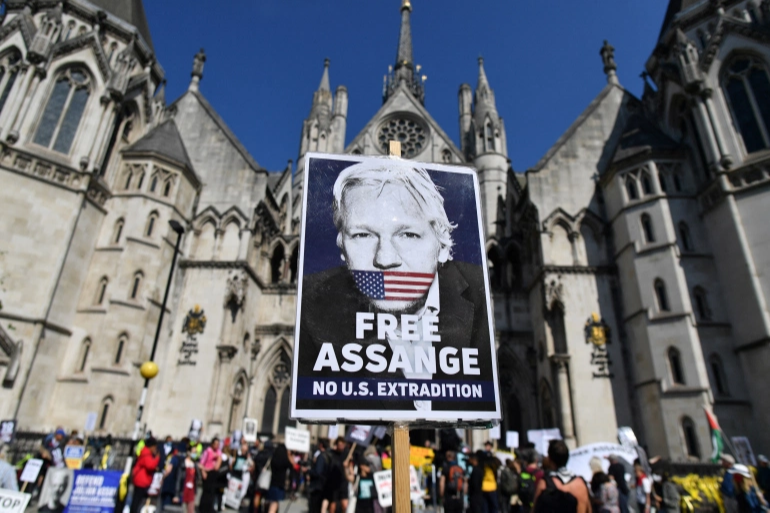
Supporters hold placards in support of Wikileaks founder Julian Assange, outside the Royal Courts of Justice in the City of London [AFP]
London, August 11 (RHC)-- A British judge is granting the United States government extra grounds to appeal a refusal to extradite WikiLeaks founder Julian Assange, after it argued the initial ruling relied on a witness who misled the court.
Two judges agreed on Wednesday to grant U.S. authorities permission to expand their grounds of appealing Baraitser’s decision to block the extradition.
District Judge Vanessa Baraitser refused in January to grant a request from Washington for Assange to face trial in the US on spying charges, ruling he was at serious risk of death by suicide.
However, lawyer Clair Dobbin, representing the U.S. government which is appealing the decision, said the judge “didn’t appreciate the weight” of expert evidence that concluded Assange was not a suicide risk. Instead, the judge relied on evidence presented by Assange’s psychiatric expert Michael Kopelman, Dobbin told the High Court in London.
She said that Kopelman had admitted to misleading the court by “concealing” that his client had fathered children while holed up in the Ecuadorian embassy in London. “She really needed to interrogate why he was willing to mislead her,” Dobbin told judges Timothy Holroyde and Judith Farbey during a preliminary appeal hearing. “Experts aren’t allowed to mislead for any reason.”
Judge Holroyde said that it was unusual for an appellate court to reconsider evidence from an expert witness when it has been accepted by a lower court. But he said it was arguable that the appeal court might make a different assessment, given that a key expert had omitted to disclose what he knew about Assange’s relationship with his partner Stella Moris. “It is my view arguable that the … DJ (district judge) erred,” he said.
The full hearing in the case, which is seen by Assange’s backers as a cause celebre for press freedom, will take place on October 27 and 28, he added.
Assange himself was remanded in custody until then. Judge Baraitser initially concluded that Assange’s mental health would deteriorate when faced with the “harsh conditions” likely to await him in the US jail system, “causing him to commit suicide.”
Assange, who is currently being held at London’s high-security Belmarsh Prison, is wanted on 18 charges in the U.S. relating to the 2010 release by WikiLeaks of 500,000 secret files detailing aspects of military campaigns in Afghanistan and Iraq.
The 50-year-old Australian followed court proceedings via a video link from prison. Stella Moris, Assange’s fiancee and the mother of his two young children, was tearful after the ruling was handed down, saying he had faced “sustained threats to his life for the past 10 years.”
“These are not just items of law, this is our lives. We have the right to exist and we have a right to live and we have a right for this nightmare to come to an end once and for all,” she told reporters.
Dozens of Assange’s supporters, including the main opposition Labour party’s former leader Jeremy Corbyn, gathered outside the court, some waving placards saying “Free Assange” and “10 years is enough.”
Supporters and lawyers for Assange have argued that he was acting as a journalist and is entitled to First Amendment protections of freedom of speech for publishing documents that exposed US military wrongdoing in Iraq and Afghanistan.
Lawyers for the U.S. government, however, have said the case is largely based on “his unlawful involvement” in the theft of the diplomatic cables and military files by US Army intelligence analyst Chelsea Manning.
After Sweden first issued an arrest warrant for Assange in 2010 over allegations of sexual assault, he sought asylum in Ecuador’s embassy in London, where he remained from 2012 until 2019.
In April 2019, Ecuador, by then governed by right-wing President Lenin Moreno, revoked his citizenship. British police dragged Assange out of the embassy.
Despite blocking his extradition, Baraitser ruled in January that Assange must remain in custody while the United States appeals the decision.

